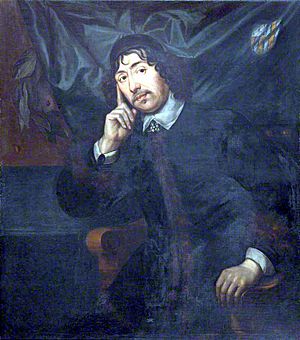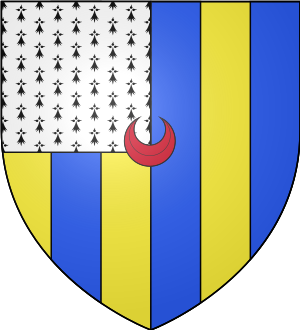James Shirley facts for kids
James Shirley (born September 1596 – died October 1666) was an English playwright. He lived during a very important time for English plays. He is known as one of the last great playwrights of his era. He wrote plays from 1625 until 1642, when the English Parliament stopped all plays from being performed.
Who Was James Shirley?
His Early Life
James Shirley was born in London. He came from an old family from Warwickshire. He went to school at Merchant Taylors' School in London. Then he studied at both Oxford and Cambridge universities. He earned his first degree in 1618.
His first poem, Echo, or the Unfortunate Lovers, was published in 1618. After finishing his studies, Shirley became a minister. He worked near St Albans. Later, he left this job because he changed his religion to Roman Catholicism. From 1623 to 1625, he was the headmaster of St Albans School. His first play, Love Tricks, was likely written while he was teaching there.
Becoming a Playwright in London
In 1625, Shirley moved back to London. For the next 18 years, he wrote more than 30 plays. These included sad plays (tragedies), funny plays (comedies), and plays that mixed both (tragicomedies). Most of his plays were performed by a group called the Queen Henrietta's Men. Shirley was their main writer, much like William Shakespeare was for the King's Men.
Shirley supported the King during his disagreements with Parliament. The Queen also showed him special kindness. He strongly disagreed with William Prynne, who had criticized plays. In 1634, Shirley wrote the words for The Triumph of Peace. This was a special show put on for the King and Queen. It was a way to respond to Prynne's criticisms.
Time in Dublin and Return to London
Between 1636 and 1640, Shirley lived in Ireland. He was likely supported by the Earl of Kildare. Three or four of his plays were performed in Dublin. They were shown at the Werburgh Street Theatre. This was the first theatre ever built in Ireland. Shirley wrote plays like The Doubtful Heir and St. Patrick for Ireland during his time there.
In 1640, he came back to London. He found out that the Queen Henrietta's Men had sold many of his plays to publishers. Because of this, he stopped working for that company. His last plays in London were performed by the King's Men.
Theatres Close and Civil War Begins
In 1642, Shirley's career as a playwright ended. This happened because all theatres in London were closed. This was due to the start of the English Civil War.
Shirley seemed to have joined the Earl of Newcastle's side in the war. But when the King's side started to lose, Shirley returned to London. He was helped by Thomas Stanley. Shirley mainly supported himself by teaching and publishing school books. He also published four small books of poems and plays between 1646 and 1659. He helped John Ogilby with his translations of the famous Greek poems, the Iliad and the Odyssey.
His Later Years and Death
James Shirley lived until Charles II became King. However, he did not write new plays for the stage. Some of his old comedies were performed again.
It is said that Shirley and his second wife died from fright and cold. This happened after the Great Fire of London in 1666. They were buried on October 29, 1666.
What Kind of Plays Did He Write?
Shirley was a very skilled playwright. He used many ideas that were popular in plays at the time. He didn't try to invent completely new stories or characters. Instead, he used familiar types of stories and people that audiences already loved. He wrote with confidence and a lot of creativity.
His writing style was similar to the great playwrights of his time. However, sometimes he used grand language for simple ideas. For example, "Clear as day" might become "day is not more conspicuous than this cunning." He avoided the extreme violence and over-the-top actions seen in some other plays. His scenes were clever, and his characters were clear and strong. He always kept a high standard for his plays on stage.
His Works
Here is a list of some of James Shirley's works. It includes when they were first published or performed.
Tragedies (Sad Plays)
- The Maid's Revenge (first printed 1639)
- The Traitor (first printed 1635)
- Love's Cruelty (printed 1640)
- The Politician (acted 1639; printed 1655)
- The Cardinal (printed 1652). This play was performed again in 2017.
City Comedies (Funny Plays Set in London)
- Love Tricks, or the School of Complement (first printed 1631)
- The Wedding (first printed 1629)
- The Witty Fair One (printed 1633)
- Changes, or Love in a Maze (printed 1632)
- Hyde Park (printed 1637)
- The Ball (printed 1639)
- The Gamester (printed 1637)
- The Lady of Pleasure (printed 1637)
Tragicomedies, Pastorals, and Other Plays
- The Grateful Servant (first printed 1630)
- The Humorous Courtier (printed 1640)
- The Bird in a Cage, or The Beauties (printed 1633)
- The Young Admiral (printed 1637)
- The Example (printed 1637)
- The Opportunity (printed 1640)
- The Coronation (printed 1640)
- The Duke's Mistress (printed 1638)
- The Royal Master (first printed 1638)
- St. Patrick for Ireland (first printed 1640)
- The Gentleman of Venice (printed 1655)
- The Doubtful Heir (printed 1652)
- The Arcadia (printed 1640)
- The Imposture (printed 1652)
- The Brothers (printed 1652)
- The Constant Maid, or Love Will Find Out the Way (first printed 1640)
- The Sisters (printed 1653)
- The Court Secret (printed 1653)
Masques and Entertainments
- A Contention for Honor and Riches (printed 1633)
- The Triumph of Peace (printed 1634)
- The Triumph of Beauty (printed 1646)
- The Contention of Ajax and Ulysses (printed 1659)
- Cupid and Death (first printed 1653)
- Honoria and Mammon (printed 1659)
In 1633, Shirley updated a play by John Fletcher called The Little Thief. Shirley's version was called The Night Walker. He also updated The Tragedy of Chabot, Admiral of France by George Chapman. Shirley's Poems (1646) included the poem Narcissus and the masque The Triumph of Beauty.
His play A Contention for Honour and Riches (1633) was later changed and made longer. It was published in 1659 as Honoria and Mammon. His play Contention of Ajax and Ulysses ends with a very famous song called "The Glories of our Blood and State." This song was often put to music. It was even played at the coronation of George IV in 1821.
When he was teaching, Shirley published an English grammar book. It was written in poetry to help young students learn. It was called Rudiments of Grammar (1656).
Revivals of His Plays
Sometimes, Shirley's plays are performed again today. Honoria and Mammon was staged in London in 2013. The Cardinal was adapted into a play called Red Snake. It was also performed in London in 2017.
See also
In Spanish: James Shirley para niños
 | Roy Wilkins |
 | John Lewis |
 | Linda Carol Brown |



